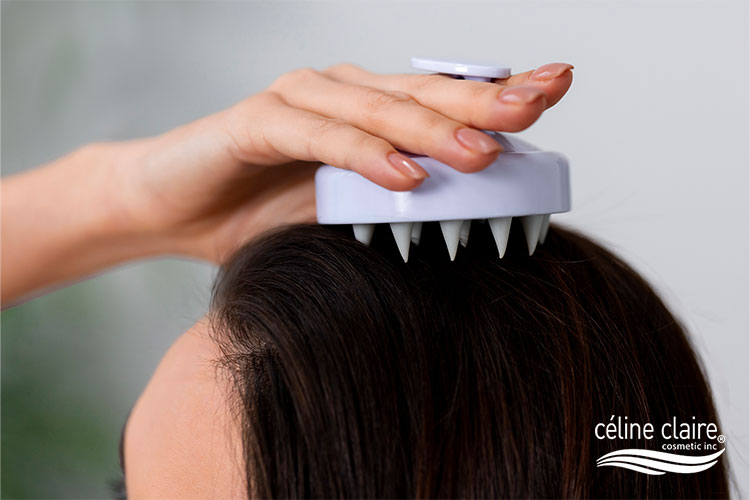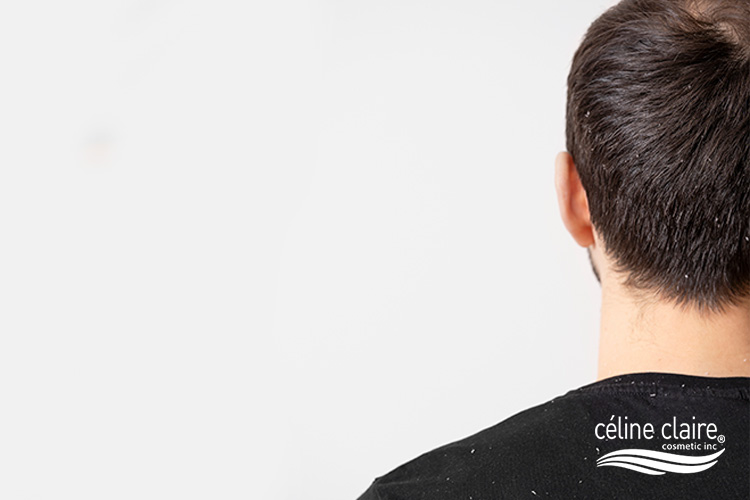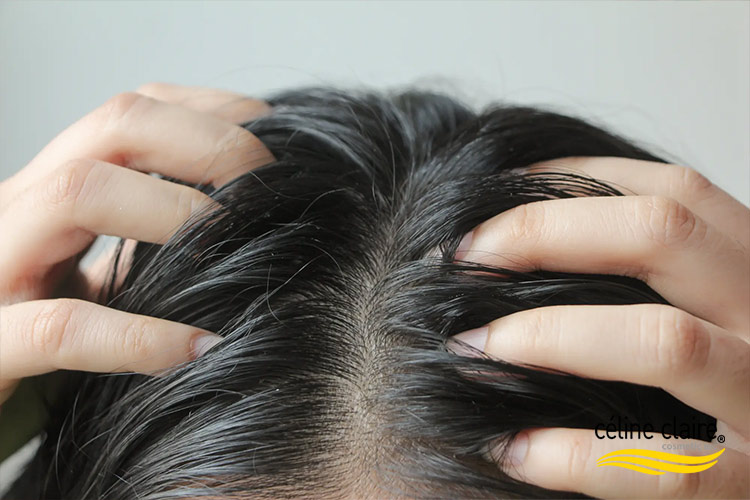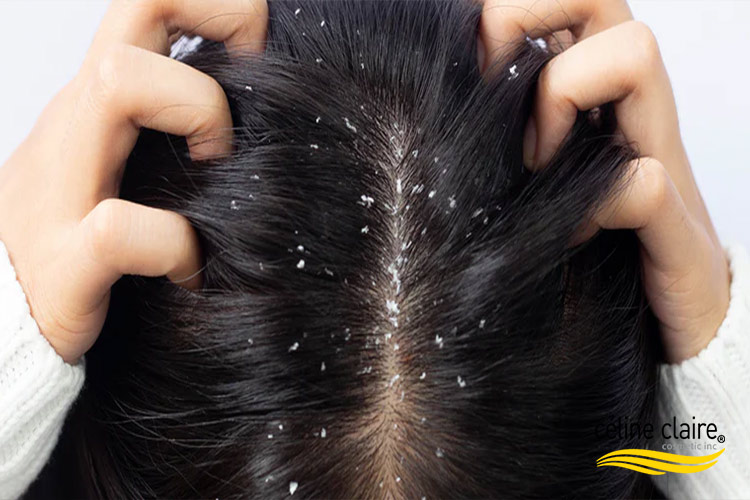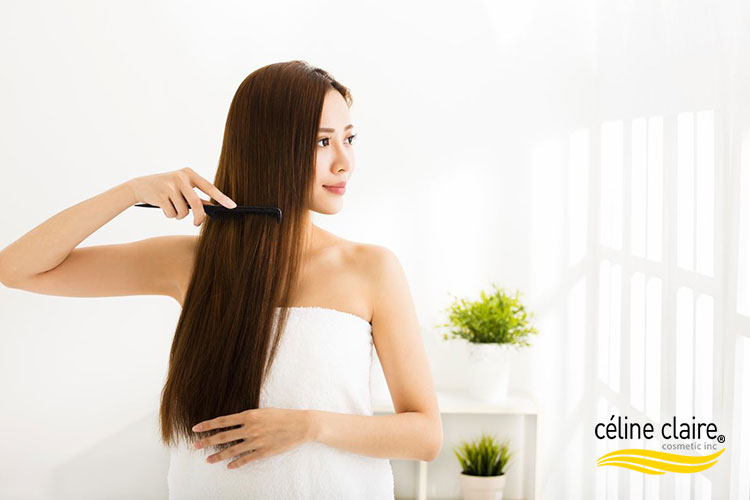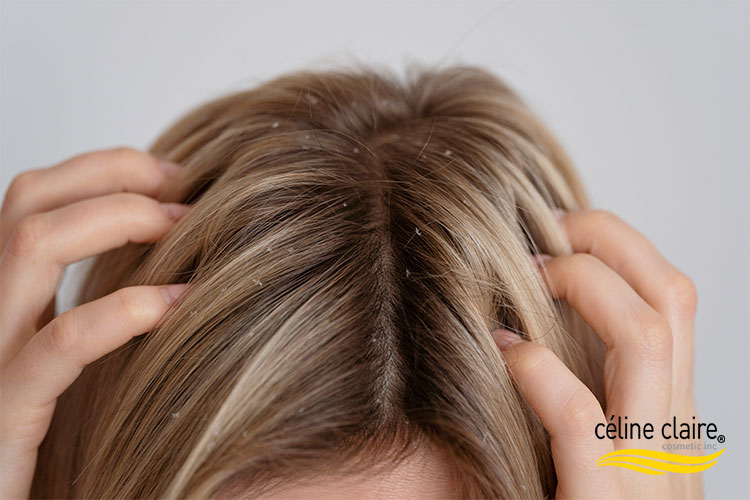
Dandruff: solutions for its treatment
Imagine this: you’re preparing for a big day, such as a business presentation or a much-anticipated dinner with your friends. You’ve carefully chosen your dress, precisely styled your hair, and are feeling confident as you take one final look in the mirror. But then, as you smooth down your hair, you notice them: little, unwanted white flakes spread across your shoulders.
Dandruff. It is a frequent problem, but it does not make it any less frustrating. For many people, it’s more than a cosmetic issue; it destroys self-confidence, turning what should be a pleasant day into one filled with self-consciousness.
But dandruff does not have to control your life. Understanding the reasons and treatments might help you recover control and confidence. You’re not alone if you’ve ever felt annoyed brushing flakes off your beloved black dress or embarrassed by an itchy, inflamed scalp. Dandruff is a common problem, especially among ladies who care as much about their hair and cosmetics as you do.
This blog post will teach you all you need to know about dandruff, from what it is and why it occurs, to the best techniques to cure and avoid it. Whether you’re seeking for natural therapies, effective hair treatment solutions, or simply want to understand the situation better, you’re in the right place.
What is Dandruff?
Dandruff. It is a term that is frequently whispered in embarrassment, but it should not be. After all, almost everyone has gone through it at some point. So, what exactly is dandruff? To put it simply, dandruff is the loss of dead skin cells on the scalp. While shedding skin cells is a natural process, dandruff develops when this process becomes too frequent, resulting in visible flakes that may be very unpleasant.
Think of your scalp as a garden. To grow, a well-tended plant needs the perfect balance of sunshine, water, and nutrients, just like your scalp does. However, when things go out of balance perhaps because of excessive use of harsh hair products, a change in weather, or even stress the garden of your scalp can suffer.
This imbalance can cause the skin on your scalp to renew too fast, resulting in an overproduction of dead skin cells, which clump together to produce the dreaded flakes.
However, dandruff is more than simply a cosmetic concern. It can also cause pain, itching, and irritation, making it both noticeable and physically uncomfortable. For many people, the symptoms might feel like a never-ending cycle: the more you scratch, the worse it becomes, resulting in more flakes and more pain.
Now, let’s clarify a widespread misconception: dandruff is not primarily caused by improper hygiene. It’s tempting to believe that flakes signal you’re not washing your hair enough, but this isn’t always the case. In fact, over-washing your hair can worsen dandruff by decreasing your scalp’s natural oils, resulting in dryness and irritation.
Dandruff may affect everyone, no matter how frequently they wash their hair. It is a condition impacted by a number of elements, which we will discuss in greater depth later. For the time being, keep in mind that dandruff does not represent your cleanliness or personal hygiene standards. Instead, it’s usually a warning that your scalp requires some additional attention and care.
So, while we keep exploring dandruff, consider it a typical scalp condition that may be addressed with the proper method. You may learn to modify your hair care regimen to better match the demands of your scalp, much as a gardener does based on the needs of their plants.
What Are the Causes of Dandruff?
Understanding the underlying source of a problem is frequently the first step toward resolving it, and dandruff is no exception. While those flakes may appear to be a small problem, they are frequently an indication of something more serious occurring beneath the surface of your scalp. To properly cure dandruff, first determine what is causing it.
Dry Skin
Dry skin is perhaps the most common cause of dandruff. If you find that your dandruff becomes worse in the winter when the air is chilly and dry, this might be the cause. Just like your skin, your scalp can become dry and flaky. This dryness causes the loss of dead skin cells, which appear as irritating white flakes.
Oily Scalp and Seborrheic Dermatitis
On the other hand, an extremely oily scalp can cause dandruff, especially in those with seborrheic dermatitis. This skin condition creates oily, red, and scaly patches that can flake off, particularly in oil gland-rich locations such as the scalp.
Sensitivity to Hair Products
Another possible cause of dandruff is sensitivity to particular hair products, often known as contact dermatitis. Some people may have an allergic response to certain components in shampoos, conditioners, or styling products, resulting in an itchy scalp and flaking.
Not Shampooing Enough
While excessive cleaning might dry out your scalp, insufficient shampooing can also cause dandruff. When you don’t shower frequently, oils and dead skin cells accumulate on your scalp, offering a feast for Malassezia yeast. This overgrowth can subsequently cause the flaking and itching associated with dandruff.
Diet and Lifestyle Factors
Lastly, your diet and lifestyle can have a big impact on the health of your scalp. Diets heavy in sugar and harmful fats, along with stress, can cause an imbalance in your body’s oil production and general skin health, including the scalp.
What Are the Symptoms of Dandruff?
If you’ve ever had an itchy scalp or seen white flakes on your clothes, you’ve seen some of the most typical signs of dandruff. However, the symptoms may differ depending on the underlying cause and severity of the condition.
White or Yellow Flakes
The most visible sign of dandruff is the presence of white or yellow flakes of dead skin on your scalp, hair, and clothes. These flakes are typically more visible when they fall on dark clothes, making them impossible to ignore.
Itchy Scalp
An itchy scalp is another common symptom of dandruff. Itching can be minor or severe, and it is sometimes increased by the peeling of dead skin cells. Scratching the itch can cause greater discomfort and flaking, creating a distressing cycle.
Redness and Irritation
Some disorders, such as seborrheic dermatitis, may cause redness and irritation on your scalp. This inflammation can make the skin sensitive to the touch, causing further discomfort.
Oily Scalp with Flakes
If your dandruff is caused by an oily scalp, you may find that your hair remains greasy even after washing. Excess oil and flakes can be especially unpleasant since your scalp seems to be overly greasy while simultaneously flaking and dry.
What Is the Treatment for Dandruff?
To properly treat dandruff, you must address both the symptoms and the underlying reasons. The good news is that there are a variety of treatments available, ranging from simple lifestyle adjustments to specialist hair treatment solutions that restore scalp balance.
Over the Counter (OTC) Shampoos
One of the most frequent and successful remedies for dandruff is to use an over-the-counter anti-dandruff shampoo. These shampoos have active chemicals that address the underlying causes of dandruff, reducing flaking, itching, and irritation.
Pyrithione Zinc
This component has antifungal and antibacterial properties that help minimize the fungus that causes dandruff. It is moderate enough for daily usage and works by reducing the formation of skin cells on the scalp.
Selenium Sulfide
This reduces the formation of natural oils in the scalp, which might provide a breeding habitat for Malassezia yeast. It works well, but it should be taken exactly as prescribed to avoid potential adverse effects such as hair darkening.
Ketoconazole
Ketoconazole, another antifungal medication, is frequently used for severe instances of dandruff. It works by damaging fungal cell membranes, killing them, and lowering scalp irritation.
Salicylic Acid
This ingredient exfoliates the scalp by eliminating dead skin cells and decreasing flakiness. It is very beneficial for people with thick dandruff scales, although it can be drying, thus it is frequently paired with a hydrating conditioner.
Prescription Treatments
A doctor may recommend stronger therapies for more severe cases of dandruff, especially those caused by illnesses such as seborrheic dermatitis or psoriasis. These may include:
Topical Steroids
Topical steroids can help relieve inflammation and irritation. They are frequently used in brief bursts to treat flare-ups.
Antifungal Creams
In rare circumstances, a stronger antifungal cream can be used directly to the scalp to battle ongoing fungal development.
Medicated Shampoo with Higher Concentrations
Prescription shampoos may contain larger quantities of active chemicals such as ketoconazole or coal tar, making them more effective for treating severe symptoms.
Lifestyle Changes
Sometimes the most effective treatment is a change in behaviors. Dandruff may be increased by stress, nutrition, and specific hair care techniques, so making lifestyle changes might help keep it under control.
Stress Management
High stress levels can cause or worsen dandruff. Incorporating stress-reduction strategies like yoga, meditation, or even a simple walk in nature will benefit your scalp health.
Dietary Changes
A diet high in B vitamins, zinc, and healthy fats improves scalp health. Reducing sugar and bad fats can also help reduce dandruff by lowering inflammation in the body.
Proper Hair Care Routine
Achieving balance in your hair care routine is essential. This includes not overwashing your hair (to avoid dryness) and frequently cleansing your scalp to prevent oil accumulation. Using lukewarm water instead of hot might also assist in keeping the natural moisture in your scalp.
What Are the Home Remedies for Dandruff?
While over-the-counter and prescription treatments are helpful, many individuals choose home remedies for a more natural way to cure dandruff. These cures are especially attractive if you like to use things you probably already have in your kitchen or bathroom.
Tea Tree Oil
Tea tree oil is well-known for its antifungal and antibacterial characteristics, making it a popular choice for treating dandruff. Adding a few drops of tea tree oil to your shampoo or mixing it with a carrier oil before massaging it into your scalp will help eliminate the fungus that causes dandruff.
Apple Cider Vinegar
Apple cider vinegar is another popular home treatment. It helps balance the pH of your scalp, making it more resistant to yeast. It also has exfoliating qualities that assist in removing dead skin cells. Mix apple cider vinegar with water and apply to your scalp before washing. Leave it on for a few minutes to let the acids perform their job.
Coconut Oil
Coconut oil is well-known for its hydrating effects, which can help ease dry, irritated scalps. It is also thought to have antibacterial properties, which can help minimize the occurrence of fungus on the scalp. Warm some coconut oil, apply it to your scalp, and let it sit for about 30 minutes before rinsing it off.
Aloe Vera
Aloe vera is widely recognized for its calming and anti-inflammatory effects. It can soothe inflamed scalps and relieve irritation while also removing dead skin cells.
Introducing Products to Improve and Treat Dandruff
In addition to home cures, several hair treatment products are particularly developed to address dandruff. These solutions frequently mix the advantages of natural substances with scientifically established formulae to get excellent effects.
Anti-Dandruff Shampoos
As mentioned earlier, OTC anti-dandruff shampoos containing chemicals like pyrithione zinc, ketoconazole, and selenium sulfide can be quite helpful. Brands such as Head & Shoulders, Nizoral, and Selsun Blue provide solutions for a variety of scalp types and dandruff severity.
Scalp Treatments
In addition to shampoos, scalp treatments such as serums and exfoliating scrubs might be beneficial. Products such as Neutrogena’s T/Gel Therapeutic Shampoo and The Body Shop’s Ginger Scalp Care are intended to treat more chronic dandruff.
Moisturizing Hair Care Products
A dry scalp is a frequent source of dandruff, so integrating moisturizing items into your routine might assist. Look for hair restoration treatments that hydrate the scalp and nourish the hair, such as deep conditioning masks or leave-in conditioners.
Does Dry Scalp Lead to Dandruff?
Understanding the relationship between dry scalp and dandruff is critical for successful treatment. Many individuals mistake the two or assume they are the same, although they are essentially separate disorders that sometimes overlap.
Dry Scalp vs. Dandruff: Understanding the Difference
Dry Scalp: A dry scalp happens when your skin does not have enough moisture. This might be caused by many things, including cold temperatures, harsh hair products, or infrequent shampooing. Symptoms include tiny, white flakes falling from the scalp, itching, and discomfort.
Dandruff: On the other hand, is commonly caused by an overgrowth of the Malassezia yeast on the scalp, resulting in bigger, oily flakes that are generally yellow or white. Dandruff can be associated with other illnesses such as seborrheic dermatitis or psoriasis.
How Dry Scalp Can Contribute to Dandruff
While dry scalp and dandruff are not the same thing, a dry scalp can occasionally cause or worsen dandruff. When your scalp is dry, it is more prone to irritation, which can compromise the skin barrier and produce an environment conducive to yeast growth. This might cause the formation of dandruff or aggravate existing dandruff.
Treating Dry Scalp to Prevent Dandruff
To prevent dry scalp from causing dandruff, keep your scalp hydrated and healthy. This includes:
- Using Moisturizing Shampoos and Conditioners: Choose products created particularly for dry scalps, such as ones containing aloe vera, hyaluronic acid, or coconut oil.
- Avoiding Harsh Hair Products: Sulfates, alcohol, and other drying chemicals can deplete your scalp’s natural oils, so limit your usage of these products.
- Regular Scalp Massages: Massaging your scalp can increase blood flow and natural oil production, which helps to keep your scalp nourished.
Tips to Prevent Dandruff
Dandruff is no exception to the rule that prevention is always preferable to treatment. By adopting a few basic behaviors into your hair care regimen, you can prevent dandruff and maintain a healthy, balanced scalp.
- Maintain a Healthy Scalp Care Routine
- Regular Washing: Keeping your scalp clean is essential for reducing the buildup of oil and dead skin cells that can cause dandruff. Use a mild shampoo that is appropriate for your hair type, and try rotating between normal and anti-dandruff shampoos.
- Balanced Conditioning: Conditioning is equally important as washing. Choose a conditioner that will moisturize your scalp without making it oily. Concentrate on the ends of your hair to prevent making your scalp greasy.
- Manage Stress Levels: Stress affects not just your mental health, but also the health of your scalp. High stress levels can cause or worsen dandruff, therefore stress management is critical.
- Relaxation Techniques: To relieve stress, incorporate activities such as yoga, meditation, or basic breathing exercises into your regular routine.
- Regular Exercise: Regular exercise is an excellent strategy to alleviate stress. It also promotes blood circulation, which is beneficial to your scalp’s health.
- Diet and Hydration: What you eat can also affect your scalp. A diet rich in B vitamins, zinc, and omega-3 fatty acids can promote scalp health and reduce dandruff.
- Eat a Balanced Diet: Include foods like fish, nuts, and leafy greens in your diet to nourish your scalp from the inside out.
- Stay Hydrated: Drink plenty of water throughout the day to keep your skin, including your scalp, well-hydrated.
Conclusion
Dandruff may be a bothersome and chronic problem, but with the appropriate understanding and treatment plan, it is completely treatable. Understanding what dandruff is, its causes, and the best ways to treat and prevent it will allow you to take charge of your scalp health and keep your hair looking great.
Remember that treating the underlying reasons and keeping a healthy routine are essential for preventing dandruff from recurring. Whether you use over-the-counter shampoos, homemade cures, or prescription treatments, consistency and attention are crucial.
FAQ
Can dandruff be completely cured?
While dandruff can be effectively managed, it’s often a recurring condition. However, with the right treatment and prevention methods, you can keep it under control and minimize flare-ups.
How often should I use anti-dandruff shampoo?
This depends on the severity of your dandruff. For mild cases, using it once or twice a week may be sufficient. For more severe cases, you might need to use it more frequently until the condition improves.
Can dandruff lead to hair loss?
Dandruff itself doesn’t cause hair loss, but severe scratching due to itching can damage hair follicles, potentially leading to temporary hair loss.
Are natural remedies effective for dandruff?
Yes, natural remedies like tea tree oil, coconut oil, and apple cider vinegar can be effective for managing mild dandruff. However, they might not be sufficient for severe cases.
Should I avoid styling products if I have dandruff?
It’s a good idea to minimize the use of heavy styling products, as they can contribute to product buildup on the scalp, exacerbating dandruff.
Can diet affect dandruff?
Yes, diet can impact the health of your scalp. Consuming a balanced diet rich in nutrients such as B vitamins, zinc, and omega-3 fatty acids can help improve scalp health and reduce dandruff. Foods like nuts, fish, and leafy greens can contribute to a healthier scalp environment.
Is dandruff contagious?
No, dandruff is not contagious. It is caused by an overgrowth of yeast on the scalp or other factors like dry skin or irritation. It cannot be spread through physical contact or shared personal items.
Can I use dandruff shampoo if I have colored hair?
Yes, you can use dandruff shampoo on colored hair. However, choose a formula that is gentle and color-safe to avoid stripping your hair of its color. Look for shampoos labeled as color-safe or those that are sulfate-free to protect your color-treated hair.
Are there any side effects of using anti-dandruff shampoos?
While anti-dandruff shampoos are generally safe, some people may experience irritation or dryness from certain ingredients, such as coal tar or selenium sulfide. If you notice increased dryness or irritation, try switching to a gentler formula or consult with a dermatologist.
Can I use essential oils to treat dandruff?
Yes, essential oils such as tea tree oil, eucalyptus oil, and rosemary oil have antifungal and anti-inflammatory properties that can help manage dandruff. Dilute essential oils with a carrier oil (like coconut or jojoba oil) before applying them to your scalp to avoid irritation.

